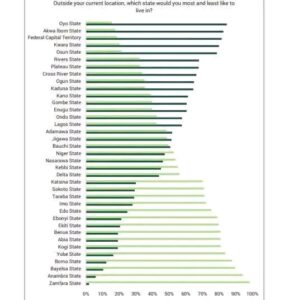A new national survey has reshaped perceptions of livability across Nigeria. According to the 2025 State Performance Index (pSPI) released by Philips Consulting, Oyo State now ranks as the most desirable state to relocate to, overtaking others based on a mix of objective metrics and public sentiment.
Key Findings & Rankings
-
The most preferred states for relocation are Oyo, Akwa Ibom, and the Federal Capital Territory (FCT).
-
At the bottom of the desirability list are Zamfara, Anambra, and Bayelsa, which emerged as the least preferred states to live in.
-
The pSPI methodology uses a combination of performance data (≈ 70%) — audited accounts, infrastructure metrics, public service delivery — and perception data (≈ 30%) collected via nationwide survey.

What Makes Oyo & Others Stand Out
Oyo’s top position reflects relatively strong performance in areas many citizens care about: infrastructure, education, health, public safety, and environmental cleanliness. Combined with favorable perception ratings, Oyo appears to have hit a balance of both visible service delivery and citizen satisfaction.
Akwa Ibom similarly scored high on environmental cleanliness and water access, among other basic service indicators. FCT’s appeal is linked to its administrative status, relatively better access to services, and perception of governance, though some finding show drops in FCT in other performance dimensions.
Why Some States Are Less Preferred
States at the bottom (Zamfara, Anambra, Bayelsa) are seen to lag in both perception and certain performance metrics. For example, in some of these states citizens report weak service delivery (health, education, infrastructure), lower satisfaction, or slower visible progress compared to peer states.
Anambra State government has rejected its low ranking, citing methodological flaws in sampling and data interpretation. They argue the survey underrepresented their population and did not fully account for certain infrastructure and educational achievements.
-
These preferences could affect internal migration patterns, state planning, and where investments (both public and private) are focused.
-
States ranked low may face reputational risk, which could affect investor confidence and human capital movement.
-
The survey’s perception component means that image, media coverage, and visible projects may influence rankings almost as much as hard metrics.
The pSPI 2025 offers more than just rankings. It highlights a divide: many Nigerians believe livability is unevenly distributed. Whether states ranked low can turn perception into progress remains the test. For those in Oyo, Akwa Ibom, and FCT, keeping up both service delivery and citizen trust will be key to preserving their new status.










